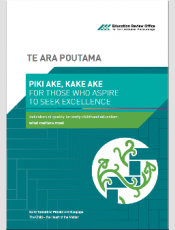We know from research that the early years are a critical time for young children’s learning and development, particularly for the youngest children (birth to three years).
Research highlights the importance of stable relationships and interactions with sensitive and responsive adults, a focus on play and routines that allow children to take the lead in their own learning, support for communication and language, and opportunities to move and be physically active.
ERO's role
ERO evaluates and reports publicly on the quality and effectiveness of education provided in early learning services. Our role encompasses accountability (including compliance with regulatory requirements), education improvement, and knowledge generation.
We regularly revise and update our approach to external evaluation in early childhood services to reflect current research and evaluation evidence about what matters most in the provision of high-quality early childhood education.
Changes in the ECE sector
Changing societal contexts, including shifting patterns of parental employment, and increasingly diverse cultural and educational aspirations have led to changes in the early childhood education (ECE) sector.
We have developed an updated Early Childhood Education methodology and are now beginning to implement this across New Zealand.
ERO's approach to review and evaluation in centre-based early childhood services
ERO is updating its approach to review and evaluation, initially in centre-based early childhood services.
New Framework and Indicators
Ngā Ara Whai Hua: Quality Framework for Evaluation and Improvement in Centre-based Early Childhood Services outlines our approach to review and evaluation for accountability and improvement. This Framework is very strongly focused on improvement while maintaining a focus on compliance with regulatory standards, and provides a new set of Indicators to support services in continuous improvement. The ultimate aim is to ensure quality early learning.
The new Framework and Indicators are designed to focus early childhood services and ERO evaluators on the things that matter most in contributing to children developing knowledge, skills, attitudes, dispositions and working theories that support lifelong learning. They will form the basis of our external evaluations of centre-based early childhood services and we hope centres will use them when undergoing internal evaluation.
Both the Framework and the Indicators will be introduced in a phased approach from late 2020.
Ngā Ara Whai Hua: Quality Framework for Evaluation and Improvement in Centre-based Early Childhood Services
The new Framework encourages services towards continuous improvement, and shows how we are differentiating our evaluation approach and how we are reporting our findings.
The Quality Framework will be the “steel backbone” for evaluating quality and performance and a basis for new ways of reporting ERO’s findings to its various audiences.
We want all services to be on a pathway of ongoing sustained improvement through a strengthened focus on the accountability part of ERO’s function.
Te Ara Poutama – Indicators of quality for early childhood education: what matters most
The Indicators of quality for early childhood services form the foundation used to evaluate quality across the system, and we hope parents will use them as a guide when choosing a service for their child. They are designed to provide guidance for centre-based evaluation across the sector, covering both the external evaluation done by ERO and the internal evaluation that services undertake themselves.
The Indicators of quality draw together research and evaluation evidence about effective practice in early childhood education contexts that promote valued learning outcomes for children in Aotearoa New Zealand. They have been developed in consultation with the sector, parents and educational experts.
Te Ara Poutama – indicators of quality for early childhood education: what matters most
New Akanuku | Assurance Reviews and Akarangi | Quality Evaluations
We have three new approaches to evaluating quality and assurance in the early childhood sector:
Akanuku | Assurance Reviews assess whether services are meeting regulatory standards. We have been implementing Akanuku since July 2019 following a trial in the first half of 2019.
An Assurance Review process will provide assurance that legal requirements being maintained, identify compliance matters to be addressed and scaffold services into a Quality Evaluation process that focuses on improvement for equity and excellence.
Akarangi | Quality Evaluations evaluate the extent to which services have the learning and organisational conditions to support children’s learning.
Quality Evaluations will integrate the Indicators of quality for early childhood education.
The intention of both Akanuku | Assurance Reviews and Akarangi | Quality Evaluations is to support services to maintain a focus on meeting licensing requirements and promote improvement through the use of the Indicators as part of service’s internal evaluation and improvement planning and ERO’s external evaluation approach.
Akamatua | Evaluating Excellence and Innovation identify, investigate and evaluate cases of excellence and innovation. We are developing this case study approach and we will be undertaking some initial case studies in selected services later in 2020 to inform the design of this approach prior to implementation in 2021.
New Assurance Reviews and Quality Evaluations
